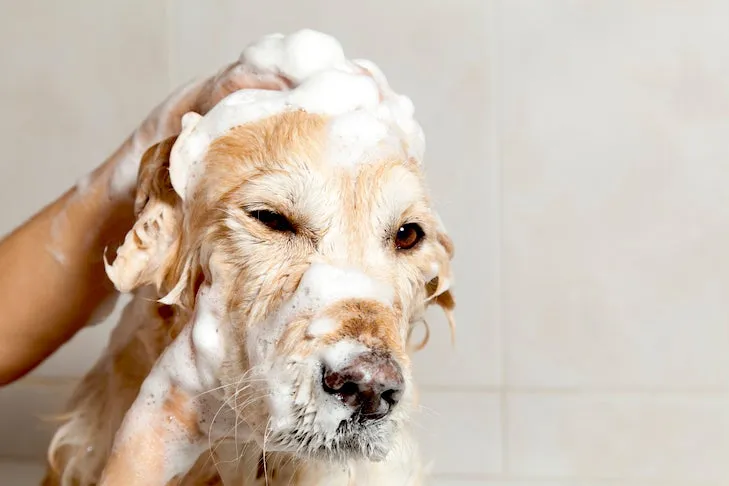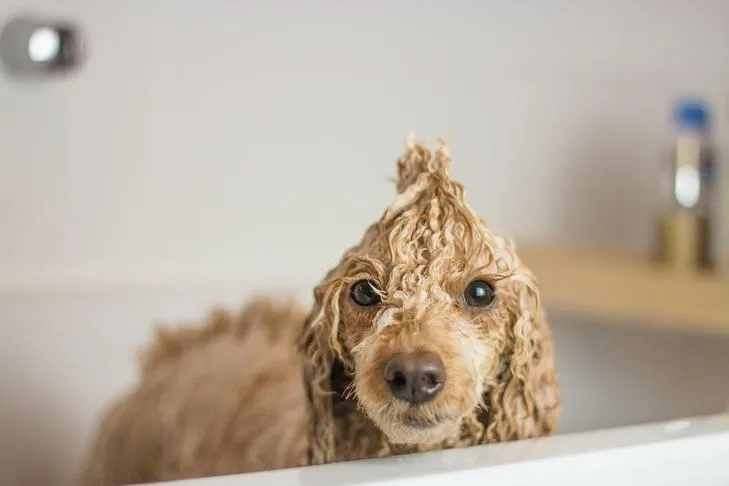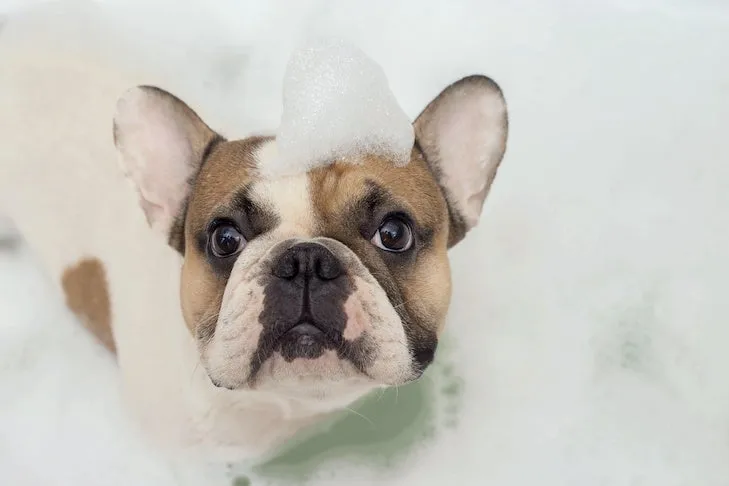Bringing a new puppy home is an exciting time, filled with cuddles, playtime, and a few inevitable messes. As your furry companion explores the world, they’ll undoubtedly encounter dirt, mud, and various delightful (to them) odors. While regular bathing is essential for their hygiene and overall health, choosing the Best Puppy Shampoo is crucial. Unlike adult dogs, puppies have delicate skin and developing coats that require a gentler touch and specialized formulations to prevent irritation and promote healthy growth. Finding the right shampoo ensures a positive bathing experience and lays the foundation for a lifetime of good grooming habits.
This comprehensive guide will walk you through everything you need to know about selecting and using the ideal puppy shampoo, ensuring your little one stays clean, comfortable, and smelling fresh. We’ll explore why puppies need their own shampoos, what ingredients to prioritize and avoid, and provide essential tips for making bath time a stress-free bonding experience. A healthy gut also contributes to a healthy coat, and knowing the best probiotic for dogs vet recommended can support overall well-being from the inside out.
Why Puppies Need Specific Shampoos
Puppies are not just smaller versions of adult dogs; their bodies are still developing, and this includes their skin and fur. Their skin is thinner and more sensitive, making them prone to dryness, irritation, and allergic reactions if exposed to harsh chemicals. A puppy’s immune system is also still maturing, meaning they are more susceptible to skin issues.
The pH balance of a puppy’s skin is also different from an adult dog’s. Human shampoos, designed for a different pH, can strip a puppy’s skin of its natural oils, leading to dryness, itching, and potential infections. Adult dog shampoos, while better than human shampoos, may still contain stronger ingredients or higher concentrations of active compounds that could be too potent for a puppy’s delicate system. Therefore, selecting a shampoo specifically formulated for puppies is paramount to protect their skin barrier, maintain moisture, and support the healthy development of their coat. These specialized shampoos are crafted with mild, tear-free formulas that cleanse effectively without causing discomfort or adverse reactions.
Key Ingredients to Look For in the Best Puppy Shampoos
When searching for the best puppy shampoo, the ingredient list is your most important guide. Prioritize naturally-derived, gentle components that cleanse, moisturize, and protect without causing harm. Look for formulas that are labeled “tear-free” to ensure bath time is as comfortable as possible for your pup’s sensitive eyes.
Here are some beneficial ingredients to seek out:
- Aloe Vera: Known for its soothing, antiseptic, and moisturizing properties, aloe vera is an excellent ingredient for gentle cleansing and protecting against future skin irritations. It helps calm any redness or itchiness on a puppy’s sensitive skin.
- Vitamin E: This powerful antioxidant is deeply moisturizing and can help nourish the skin and condition the coat, making it softer and easier to detangle. It supports overall skin health and can contribute to a shiny, healthy puppy coat.
- Oatmeal (Colloidal Oats): A classic soothing agent, oatmeal contains Vitamin B, which penetrates deeply to deliver moisture and relieve itchy, dry skin. It’s especially beneficial for puppies prone to minor skin irritations or those with naturally sensitive skin.
- Coconut Oil: This natural ingredient acts as both a cleanser and a moisturizer, leaving your puppy’s skin hydrated and their coat soft and lustrous. It also has mild antibacterial properties.
- Chamomile Extract: Often used for its calming and anti-inflammatory benefits, chamomile can help soothe irritated skin and provide a gentle, pleasant scent.
- Natural Scents: While artificial fragrances should be avoided, natural scents derived from ingredients like kiwi or coconut can leave your puppy smelling fresh without exposing them to harsh chemicals. Shampoos using plant-derived ingredients, such as those with oatmeal, often have a naturally pleasant and subtle aroma.
- Soap-Free Formulas: Opt for shampoos that are soap-free, as these are less likely to strip natural oils from the skin, preventing dryness and irritation. They clean effectively using gentler surfactants.
These ingredients work synergistically to clean your puppy’s coat while protecting their delicate skin, making bath time a beneficial experience for their health and comfort.
What to Avoid in Puppy Shampoos
Just as important as knowing what to look for, understanding which ingredients to avoid is critical for your puppy’s health. Many common additives in human and even some adult dog shampoos can be harmful to a puppy’s sensitive skin and overall well-being.
- Human Shampoo: Never use human shampoo on your puppy. The pH level of human skin is significantly different from a dog’s, and human shampoos can strip the natural protective oils from a puppy’s skin, leading to dryness, irritation, and potential infections. This imbalance can severely compromise their skin barrier.
- Artificial Fragrances: While a pleasant scent is appealing, artificial fragrances are often derived from chemicals that can cause allergic reactions, skin irritation, and even respiratory issues in sensitive puppies. Prioritize naturally scented or unscented options.
- Parabens: These are preservatives used in many cosmetic products but have been linked to hormonal disruptions and potential health concerns. It’s best to avoid them, especially for young, developing puppies.
- Dyes: Artificial dyes offer no benefit to your puppy’s hygiene or coat health and can be potent allergens. They are unnecessary chemicals that can cause skin irritation and, in some cases, more serious health problems.
- Sulfates: Ingredients like Sodium Lauryl Sulfate (SLS) and Sodium Laureth Sulfate (SLES) are harsh detergents that create lather but can strip natural oils, leading to dry, itchy skin and a dull coat. Look for sulfate-free formulas.
- Phthalates: These chemicals are often found in fragrances and can also be endocrine disruptors. Avoiding products with phthalates is a good practice for overall pet health.
By carefully scrutinizing the ingredient list and opting for products free from these harmful components, you can ensure you’re providing the safest and best puppy shampoo for your growing companion. Always choose products made by reputable manufacturers, ideally those with transparent ingredient lists and “made in USA” labels for quality assurance.
 Golden Retriever puppy getting a bath, enjoying the gentle water.
Golden Retriever puppy getting a bath, enjoying the gentle water.
Top Considerations When Choosing the Best Puppy Shampoo
Selecting the perfect puppy shampoo goes beyond just checking ingredients; it also involves considering your puppy’s individual needs. Different puppies may have varying coat types, skin sensitivities, or even specific health concerns that influence the best choice of shampoo.
Coat Type and Condition
- Single-Coated Puppies: Breeds like Greyhounds or Boxers have shorter, often finer coats. They benefit from gentle shampoos that cleanse effectively without drying out their delicate skin, helping to repel dust and maintain a healthy sheen.
- Double-Coated Puppies: Breeds such as Golden Retrievers or German Shepherds have a dense undercoat and a longer outer coat. These puppies need shampoos that can penetrate both layers to cleanse thoroughly and prevent matting, while still being gentle enough for their skin.
- Wiry or Silky Coats: Some puppies, like terriers or spaniels, have unique coat textures that might benefit from specific conditioners or detangling agents alongside their shampoo to prevent tangles and maintain coat health.
Skin Sensitivity and Allergies
If your puppy has particularly dry, itchy, or sensitive skin, or if they show signs of allergies, a specialized sensitive skin puppy shampoo is essential. These formulas are extra mild, often hypoallergenic, and designed to cleanse without stripping moisture or worsening existing conditions. Ingredients like colloidal oatmeal or aloe vera are particularly beneficial here. Always consult your veterinarian if your puppy has persistent skin issues, as they can recommend the best puppy shampoo or medicated options tailored to their specific needs. Understanding conditions like skin allergies can also lead you to explore options like the best probiotic for dogs with skin allergies for internal support.
Specific Concerns (e.g., Fleas, Odor)
While the focus is on puppy-safe formulas, sometimes specific issues arise.
- Flea and Tick Concerns: If your puppy is dealing with fleas or ticks, consult your vet first. They might recommend a specific flea and tick shampoo that is safe for puppies, or advise on topical treatments. Ensure any shampoo used won’t interfere with other preventative medications.
- Odor Control: Puppies can get into stinky situations. While avoiding artificial fragrances, some puppy shampoos use natural deodorizing agents or pleasant natural scents (like oatmeal or coconut) to help neutralize odors without harsh chemicals. For really stubborn odors, like a skunk spray, specialized skunk shampoos designed for pets might be necessary, but always check if they are safe for puppies and use with extreme caution around the eyes.
 Wet Poodle standing in the bathtub, looking directly at the camera after a bath.
Wet Poodle standing in the bathtub, looking directly at the camera after a bath.
Veterinarian Recommendations
When in doubt, your veterinarian is an invaluable resource. They can assess your puppy’s health, coat, and skin condition to recommend the most appropriate shampoo. If your puppy has any underlying health issues, a vet can help you choose a shampoo that won’t exacerbate them and might even suggest medicated options if necessary, such as for specific bacterial or fungal conditions. Medicated shampoos often require a prescription or specific guidance from a professional. For overall digestive health, which can sometimes impact skin and coat, exploring the best pre probiotics for dogs could be beneficial.
How to Make Bath Time Enjoyable for Your Puppy
Bath time doesn’t have to be a dreaded chore; with the right approach and the best puppy shampoo, it can become a positive bonding experience. Professional groomers emphasize the importance of making bath time a comfortable and even enjoyable part of your puppy’s routine from a young age.
Preparation is Key
- Relax Yourself: Puppies are highly sensitive to your emotions. If you’re stressed, your puppy will sense it. Approach bath time with a calm and relaxed demeanor.
- Acclimatization: Before the first full bath, let your puppy get used to the bathtub or bathing area. Place them in an empty tub, offer praise and treats, and let them explore. Repeat this a few times until they seem comfortable.
- Exercise First: A tired puppy is a cooperative puppy. Take your puppy for a walk or engage in a vigorous play session before bath time to help them burn off excess energy.
- Gather Supplies: Have everything you need within arm’s reach: your chosen best puppy shampoo, towels, a brush, treats, and perhaps a non-slip mat for the tub.
- Brush Before Bathing: Always brush your puppy thoroughly before getting them wet. This helps remove loose hair, dirt, and any tangles or mats, making the shampooing process much more effective and preventing mats from tightening when wet.
- Check Water Temperature: Ensure the water is lukewarm, never hot or cold. Test it on your inner wrist to confirm it’s comfortable.
The Bathing Process
- Gentle Wetting: Use a soft stream of water from a handheld showerhead or a pitcher to thoroughly wet your puppy’s coat down to the skin. Start from their neck and work backward, being careful around their face.
- Lather with Puppy Shampoo: Apply a small amount of your chosen best puppy shampoo and gently work it into a lather, massaging it into their coat. Focus on areas that get particularly dirty, like paws and underbelly.
- Protect Sensitive Areas: Be extremely careful to avoid getting shampoo in your puppy’s eyes, nose, mouth, and ears. You can place cotton balls loosely in their ears to prevent water from entering, but remove them immediately after the bath.
- Massage and Soothe: Use gentle, circular motions as you lather the shampoo. This not only helps distribute the product evenly but also provides a soothing massage that can help your puppy relax. Offer calm verbal praise.
- Thorough Rinsing: This is perhaps the most crucial step. Rinse your puppy’s coat thoroughly with warm water until all traces of shampoo are gone. Residual shampoo can irritate the skin and leave a dull film. Even when you think all the suds are gone, rinse again. Look for a best liquid probiotic for dogs as a convenient way to support their gut health after a refreshing bath.
 French Bulldog puppy enjoying a bubble bath with bubbles on its head.
French Bulldog puppy enjoying a bubble bath with bubbles on its head.
Drying and Aftercare
- Towel Dry: Use several thick, absorbent towels to blot (don’t rub vigorously) as much water from their coat as possible. Rubbing can create tangles and irritate the skin.
- Air Dry or Low Heat Blow Dryer: In a warm room, you can let your puppy air dry. If using a blow dryer, ensure it’s on the lowest, coolest setting and keep it moving to prevent overheating. Never use high heat.
- Reward and Praise: Once your puppy is clean and dry, offer plenty of praise, cuddles, and their favorite treats. This positive reinforcement helps them associate bath time with good experiences.
- Prepare for the Zoomies: Many puppies (and dogs!) get a burst of energy, known as “zoomies,” after a bath. Give them space to shake off and run around if they wish!
By following these tips and consistently using the best puppy shampoo for their needs, you can transform bath time from a potential struggle into a happy and healthy ritual that strengthens the bond between you and your cherished puppy. Good grooming contributes significantly to their overall health, comfort, and happiness.
For maintaining overall canine health, especially their digestive system, understanding the best probiotics for dogs gut health is an excellent next step in pet care.

 Wet Poodle standing in the bathtub, looking directly at the camera after a bath.
Wet Poodle standing in the bathtub, looking directly at the camera after a bath. French Bulldog puppy enjoying a bubble bath with bubbles on its head.
French Bulldog puppy enjoying a bubble bath with bubbles on its head.